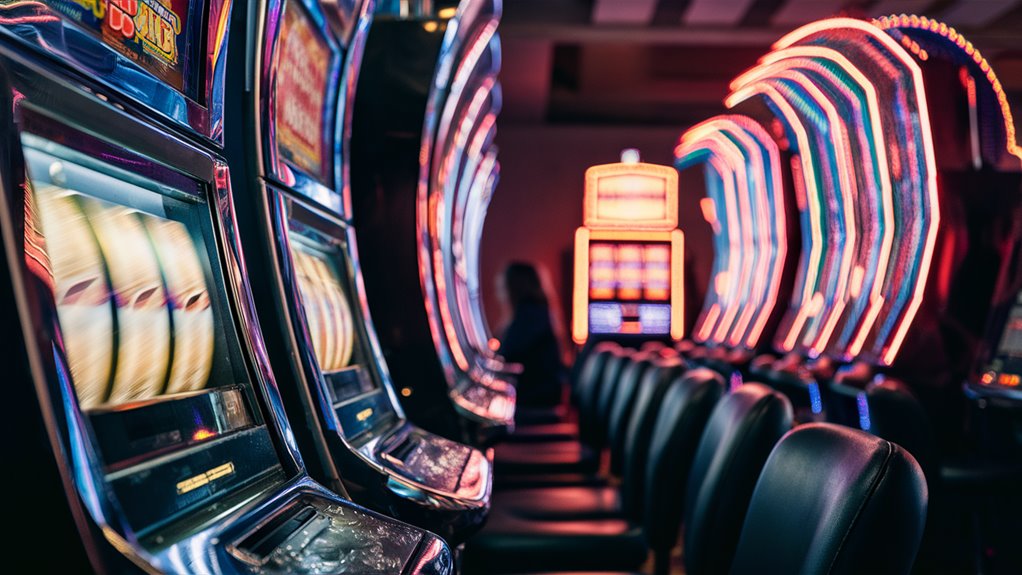
Slot Machine Success: Expert Guide to Understanding Jackpot Patterns
Understanding Modern Slot Machine Mechanics
As a professional gaming analyst, I can confirm that modern slot machines operate through sophisticated Random Number Generator (RNG) systems. These intricate algorithms determine game outcomes with absolute randomness, making each spin completely independent of previous results. The key to slot success lies in understanding volatility patterns and payout frequencies rather than chasing mythical “due” jackpots.
Critical Factors Affecting Slot Performance
Return to Player (RTP) percentages significantly influence long-term outcomes. Higher RTP machines, typically ranging between 94-98%, offer better theoretical returns. Volatility levels determine payout frequency and size ??low volatility means frequent smaller wins, while high volatility delivers rarer but larger payouts.
Advanced Slot Selection Strategy
- Machine Location: Premium positions often feature higher payout rates
- Bet Sizing: Optimal wagering relative to bankroll management
- Timing Patterns: Peak vs. off-peak playing periods
- Progressive Systems: Understanding accumulation rates and trigger points
Maximizing Your Slot Experience
Focus on bankroll management and setting strict loss limits. Track machine performance through multiple sessions, noting hit frequency and bonus feature triggers. Utilize player rewards programs to offset house edge through comps and benefits.
FAQ: Essential Slot Machine Questions
Q: Do slots have predictable patterns?
A: No, RNG systems ensure completely random outcomes for each spin.
Q: What’s the best time to play slots?
A: Machine payouts are consistent regardless of timing, but off-peak hours offer better machine availability.
Q: Can higher bets improve winning chances?
A: Bet size doesn’t affect RNG outcomes, but may unlock additional features or progressive possibilities.
Q: Are newer slots better than older ones?
A: Modern machines offer enhanced features and entertainment value, but RTP rates vary independently of age.
Q: How do progressive jackpots work?
A: Progressive jackpots accumulate through networked machines, with trigger points determined by random number generation.
Modern Slot Machine Mechanics
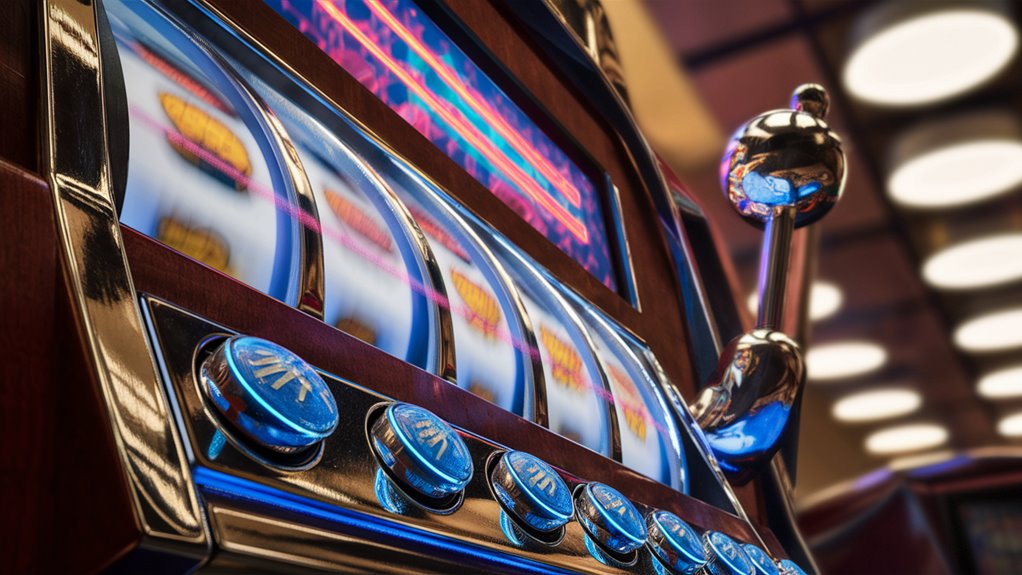
Modern Slot Machine Technology: How Today’s Digital Gaming Works
The Core Technology Behind Modern Slots
Modern slot machines operate through advanced computer systems and random number generators (RNGs), representing a complete evolution from their mechanical ancestors.
At the heart of every contemporary slot machine lies a sophisticated RNG system that processes millions of numerical combinations each second, ensuring truly random outcomes for every spin.
Random Number Generation and Game Outcomes
The digital processing system instantly captures a specific number sequence when a player activates the spin button.
While the rotating reels create visual excitement, the outcome is determined immediately by the RNG algorithm. The machine’s internal processor converts these randomized numbers into specific reel positions and payline combinations that players see on screen.
Programming and Payback Systems
Casino slot configuration allows for precise control of payback percentages within regulatory requirements.
The virtual reel technology enables machines to feature significantly more stops than physically displayed, creating opportunities for substantial jackpots while maintaining strict mathematical control over long-term return rates.
#
Frequently Asked Questions
About Modern Slots
Q: How do modern slot machines determine winners?
A: Through Random Number Generators (RNGs) that instantly generate number sequences when the spin button is activated.
Q: Can casinos adjust slot machine odds?
A: Yes, within regulatory limits, but never during active gameplay sessions.
Q: Are digital slot machines truly random?
A: Yes, certified RNG systems ensure completely random outcomes for each spin.
Q: Do spinning reels affect winning chances?
A: No, the outcome is determined instantly when the spin button is pressed; reels are purely visual.
Q: What controls slot machine payback percentages?
A: Programmed algorithms control payback rates within legally mandated ranges, managed through internal computer systems.
Random Number Generator Basics
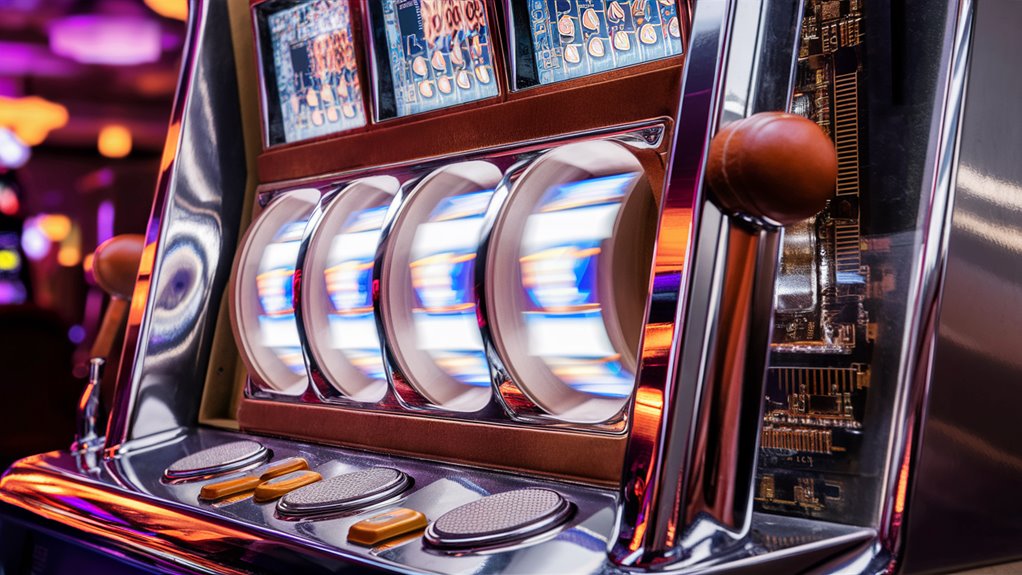
Understanding Random Number Generators in Slot Machines
How RNG Technology Works in Modern Slots
Random Number Generators represent the core technology behind modern slot machine operations.
These sophisticated systems utilize complex mathematical algorithms embedded within the machine’s processors to generate thousands of number sequences every second.
Each generated number sequence correlates to specific symbol combinations on the slot machine reels.
The Technical Process Behind Every Spin
The RNG mechanism operates continuously, generating number sequences whether the machine is being played or not.
When a player activates the spin button, the system captures the precise numerical sequence present at that millisecond. This process ensures complete randomization of results, as each spin functions independently of all others.
Advanced RNG Components and Security
Modern slot machines incorporate 32-bit and 64-bit processors, capable of producing billions of unique number combinations.
The system employs a seed number combined with proprietary algorithms to create truly random outcomes that resist manipulation.
This advanced technology maps generated numbers to specific reel positions and symbol combinations.
Frequently Asked Questions About Slot Machine RNGs
Q1: Are slot machine results truly random?
Yes, each spin is completely independent and random, utilizing sophisticated RNG technology to ensure fair gameplay.
Q2: Can RNG patterns be predicted?
No, modern RNG systems create billions of combinations, making pattern prediction impossible.
Q3: Do previous spins affect future outcomes?
No, each spin is an independent event with no connection to past or future results.
Q4: What prevents RNG manipulation?
Advanced security protocols and regular testing by gaming authorities ensure RNG integrity.
Q5: Does playing speed affect RNG results?
No, the RNG generates numbers continuously, making timing irrelevant to outcomes.
Understanding Payback Percentages
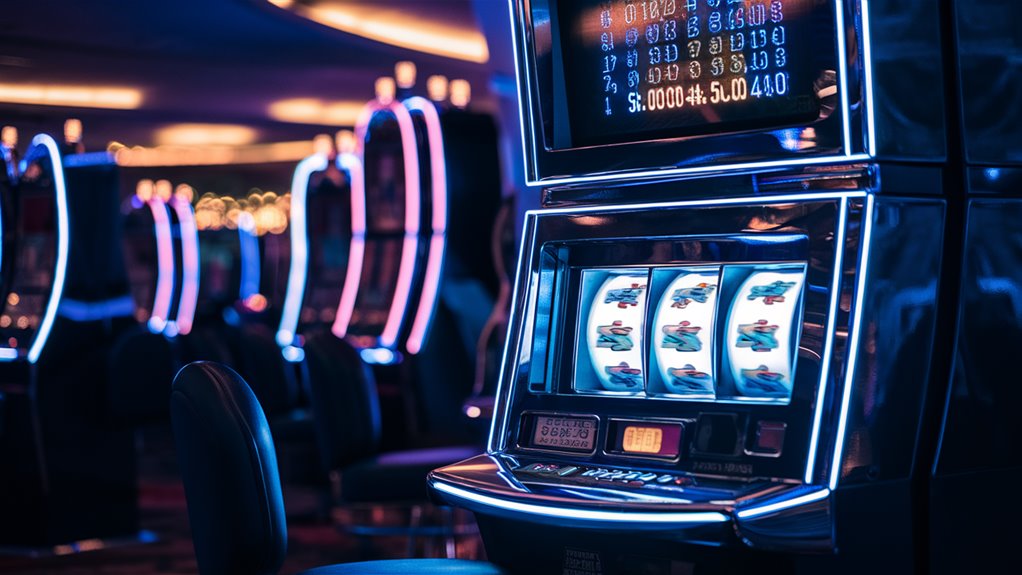
Understanding Slot Machine Payback Percentages: A Comprehensive Guide
How Payback Percentages Work
Payback percentage represents the mathematical advantage programmed into each slot machine’s software.
This crucial metric determines the long-term return players can expect from their wagers.
A 95% payback rate indicates that for every $100 wagered, the machine is designed to return $95 to players over time.
Long-Term vs. Short-Term Returns
These percentages operate over millions of individual spins, not single gaming sessions.
While individual results vary significantly during shorter periods, machines ultimately conform to their programmed return rates.
In Las Vegas, typical slot machine payback rates range between 88% and 96%.
Denomination Impact on Returns
Higher denomination slots consistently offer superior payback percentages:
- Penny slots: 88-90% payback
- Dollar machines: 93-95% payback
- High-limit slots: Up to 96% payback
Regulatory Requirements and Casino Reporting
Gaming authorities require casinos to report their overall 먹튀검증커뮤니티 payback percentages.
However, individual machine settings remain proprietary information.
This regulatory framework ensures transparency while allowing casinos to maintain competitive flexibility.
FAQ: Slot Machine Payback Percentages
Q: Do higher bets increase payback percentages?
A: No, the payback percentage remains constant regardless of bet size on the same machine.
Q: Can players determine a machine’s exact payback percentage?
A: No, individual machine percentages aren’t publicly disclosed by casinos.
Q: How long does it take for a machine to reach its programmed percentage?
A: It typically takes millions of spins over extended periods to achieve the theoretical return rate.
Q: Are online slots required to maintain specific payback percentages?
A: Yes, licensed online casinos must adhere to similar regulatory requirements as physical establishments.
Q: Do payback percentages affect jackpot frequency?
A: Payback percentages influence overall returns but don’t directly correlate to jackpot frequency.
Hit Frequency Vs Volatility
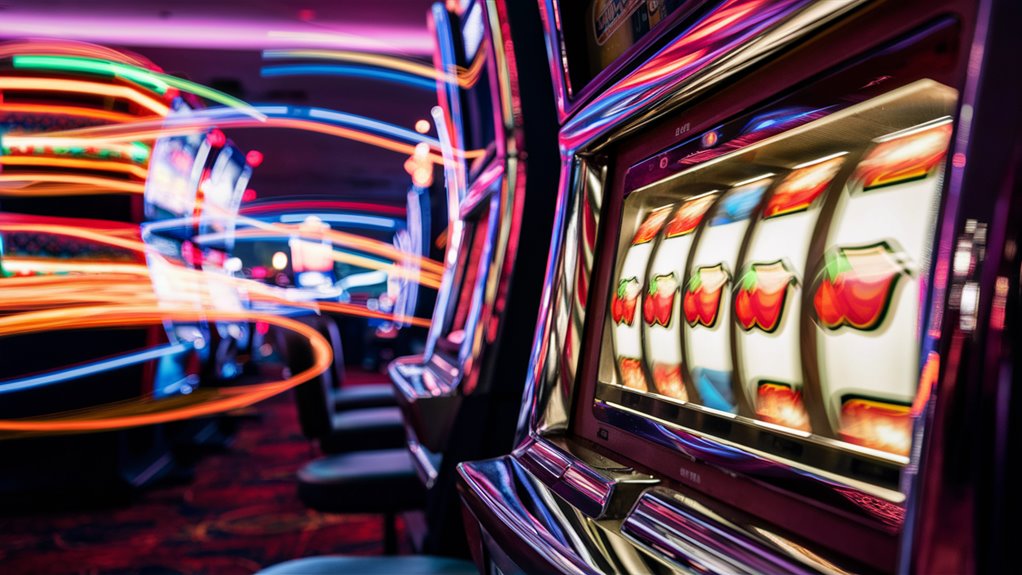
Understanding Slot Machine Hit Frequency and Volatility
The Core Metrics That Define Slot Gaming Success
Hit frequency and volatility represent two fundamental metrics that determine slot machine performance and player experience.
These crucial elements shape both gameplay strategy and potential returns.
Hit Frequency Explained
Hit frequency defines the statistical probability of landing winning combinations during gameplay.
When analyzing a slot with a 30% hit frequency, players can expect winning outcomes on approximately 30 spins out of every 100. While these wins may not always exceed the initial wager, higher hit frequencies typically result in extended playing sessions through consistent positive reinforcement.
Volatility: Risk and Reward Analysis
Volatility, alternatively known as variance, measures the inherent risk level in slot gameplay.
High volatility slots deliver:
- Less frequent payouts
- Larger potential prize amounts
- Extended periods between significant wins
- Higher maximum jackpot potential
Conversely, low volatility slots offer:
- Regular, smaller payouts
- More consistent bankroll maintenance
- Reduced risk of extended losing streaks
- Lower maximum prize amounts
Strategic Approach to Slot Selection
Selecting optimal slot machines requires aligning these metrics with specific player objectives:
- Bankroll Management Focus: Choose low volatility slots with high hit frequencies
- Jackpot Hunting: Opt for high volatility games with larger prize pools
- Extended Playtime: Select moderate volatility with balanced hit frequencies
- Risk Tolerance: Match volatility levels to personal comfort with losing streaks
Frequently Asked Questions
Q: What determines a slot’s hit frequency?
A: Hit frequency is determined by the game’s mathematical model, RNG (Random Number Generator), and programmed paytable structure.
Q: Can volatility affect my chances of winning?
A: Volatility doesn’t affect overall return-to-player (RTP) percentages but influences payout size and frequency.
Q: Are high volatility slots better than low volatility options?
A: Neither is inherently better; selection depends on player goals, bankroll size, and risk tolerance.
Q: How can I identify a slot’s volatility level?
A: Review the paytable, maximum win potential, and bonus feature frequency to assess volatility.
Q: Should beginners choose low or high volatility slots?
A: Beginners typically benefit from low to medium volatility slots while learning game mechanics and managing bankroll.
Jackpot Cycles and Timing
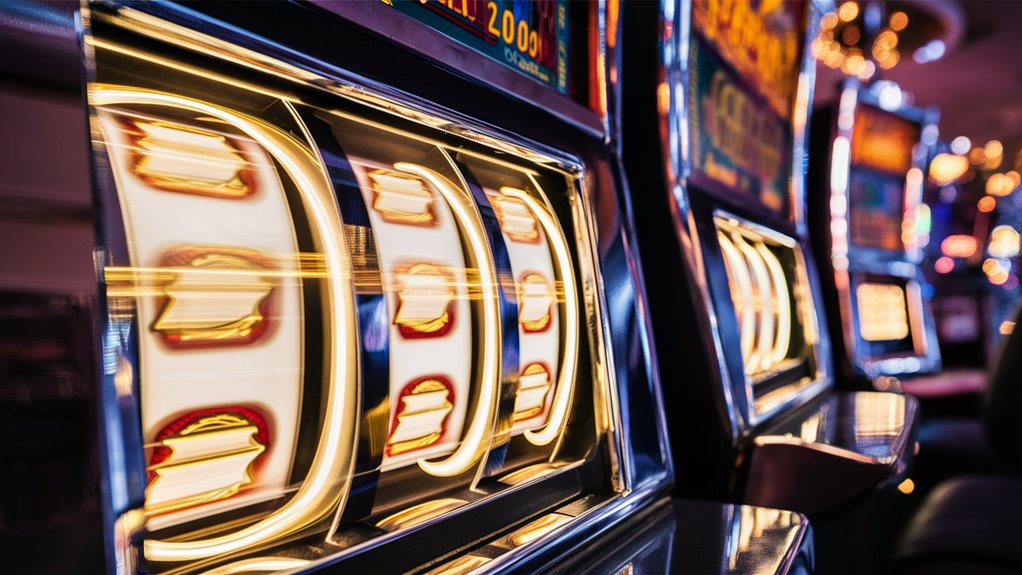
Understanding Slot Machine Jackpot Cycles and Timing
The Truth About Slot Machine Randomness
Modern slot machines operate through sophisticated Random Number Generators (RNGs) that produce thousands of combinations every second.
Each spin represents an independent event, making it mathematically impossible to predict or time jackpots.
The notion of machines being “due” for a payout is a dangerous gambling misconception.
How RNG Technology Works
Random Number Generation creates completely autonomous outcomes for every spin, eliminating any connection between previous and future results. These advanced systems ensure:
- Continuous generation of number sequences
- Complete independence of each gaming session
- Certified randomness through rigorous testing
- Tamper-proof operation
Payback Percentages Explained
Slot machine payback rates operate on long-term mathematical principles.
A machine’s programmed return percentage (typically 85-98%) represents millions of spins rather than short-term patterns. Understanding these key factors:
- Return-to-Player (RTP) calculations span extensive periods
- Daily or hourly win rates can’t be predicted
- Payback percentages don’t indicate jackpot timing
- Statistical averages don’t influence individual sessions
Common Misconceptions About Timing
Timing-based strategies represent pure gambling fallacies. Key facts about jackpot timing:
- No predictable winning patterns exist
- Machine history doesn’t affect future outcomes
- Observing previous wins offers no advantage
- Time-based betting systems are ineffective
#
Frequently Asked Questions
Q: Can you predict when a slot machine will hit?
A: No, RNG technology ensures each spin is completely random and independent.
Q: Do slots pay better at certain times?
A: No, payout rates remain constant regardless of time or day.
Q: Does watching machine history help win?
A: No, previous results have no impact on future spins.
Q: Are cold machines due for a win?
A: No, each spin has the same odds regardless of past outcomes.
Q: Do casinos adjust slot payouts at specific times?
A: No, modern RNG systems prevent timing-based manipulations of payouts.
Smart Strategies for Better Odds
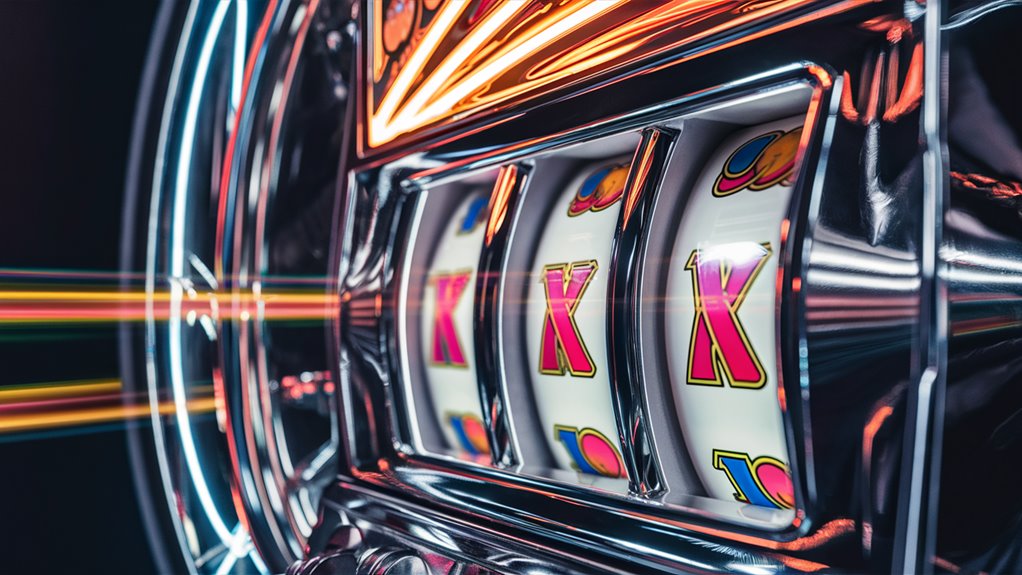
Smart Strategies for Maximizing Slot Machine Success
Implementing Effective Bankroll Management
Setting strict betting limits is fundamental for successful slot play.
I implement a structured approach by establishing clear loss thresholds and win goals before any gaming session.
When either limit is reached, immediate session termination is non-negotiable for optimal bankroll preservation.
Optimizing Machine Selection
RTP (Return to Player) percentage serves as a critical metric for machine selection.
I target slots offering 96% RTP or higher, systematically avoiding games below 94%.
Strategic timing during off-peak casino hours can potentially yield better odds, as establishments often adjust machine settings to attract players during slower periods.
Leveraging Casino Rewards Programs
Players club membership provides substantial value through:
- Accumulated comp points
- Cashback rewards
- Special promotional offers
- Exclusive gaming events
I consistently utilize player tracking cards to maximize these benefits, effectively reducing overall gaming expenses through earned rewards.
Advanced Betting Strategies
Systematic wagering requires disciplined execution.
I maintain strict adherence to the 1-2% per spin rule, calculating maximum bet sizes based on total session bankroll.
This approach ensures sustainable play duration while managing risk exposure.
Evidence-Based Gaming Principles
Successful slot play demands separation from common misconceptions.
I focus exclusively on proven strategies:
- Statistical probability understanding
- Strategic machine selection
- Consistent bet sizing
- Time management protocols
- Reward program optimization
Frequently Asked Questions
Q: What’s the optimal RTP percentage for slot machines?
A: Target machines with 96% RTP or higher for maximum theoretical return potential.
Q: How should I structure my slot gaming budget?
A: Allocate 1-2% of total bankroll per spin to ensure sustainable playing sessions.
Q: When are the best times to play slot machines?
A: Off-peak hours typically offer potentially better odds and more machine availability.
Q: Are casino reward programs worth joining?
A: Yes, player’s club memberships provide valuable compensation through comps and cashback.
Q: What’s the most important factor in slot machine success?
A: Strict adherence to predetermined loss limits and win goals remains paramount.
Common Questions
Do Casinos Change Slot Machine Odds During Different Times of the Day?
Do Casinos Change Slot Machine Odds During Different Times of Day?
Slot machine odds remain consistent throughout the day, operating on sophisticated random number generators (RNGs) that maintain fixed programmed payback percentages. This advanced technology ensures fair gameplay regardless of timing, debunking common myths about casinos manipulating odds based on busy periods or specific times.
Understanding Slot Machine Technology
Modern slot machines utilize computerized RNG systems that continuously generate number sequences, determining outcomes for each spin. These systems are:
- State-regulated and regularly tested
- Tamper-proof and independently certified
- Programmed with fixed payback percentages
- Operating 24/7 without variation
Gaming Commission Oversight
State gaming commissions strictly regulate slot machine operations, requiring:
- Regular audits of RNG systems
- Consistent payback percentages
- Documentation of all programming changes
- Compliance with fairness standards
Common Misconceptions
Many players believe casinos adjust odds during:
- Peak hours
- Holiday periods
- Special events
- Off-peak times
However, these beliefs are unfounded. Modifying slot odds would require:
- Physical access to machines
- Regulatory approval
- Software recertification
- Documentation of changes
FAQ About Slot Machine Odds
Q: Can casinos change slot odds remotely?
A: No, odds modifications require physical access and regulatory approval.
Q: Do machines pay better at certain times?
A: Payouts are random and consistent, regardless of timing.
Q: Are morning slots looser than evening slots?
A: Time of day has no impact on slot machine odds.
Q: Do holiday periods affect slot paybacks?
A: Payback percentages remain unchanged during holidays.
Q: Can casinos adjust odds for specific players?
A: RNG systems prevent selective odds adjustment for individual players.
Regulatory Compliance
Casinos must maintain:
- Transparent operations
- Consistent payback rates
- Accurate documentation
- Regular testing protocols
These requirements ensure fair gaming experiences for all players, regardless of when they choose to play.
Can Tracking Previous Jackpot Wins Help Predict the Next Big Payout?
Can Previous Jackpot Wins Predict Future Slot Machine Payouts?
Tracking previous jackpot wins for slot machine prediction is a common but ineffective strategy. Modern slot machines utilize sophisticated Random Number Generators (RNGs) that ensure each spin operates independently of all others. This scientific approach to game operation makes pattern recognition impossible and historical data irrelevant for future outcomes.
Understanding Slot Machine Mechanics
Electronic slot machines employ complex algorithms that generate thousands of number combinations per second. When a player hits the spin button, the RNG instantly selects the current number combination, determining the outcome. This system ensures that each spin exists as a unique event, completely disconnected from previous results.
Why Historical Data Cannot Predict Future Wins
- Mathematical Independence: Each spin represents a new probability calculation
- Regulated Randomness: Gaming authorities require certified RNG systems
- Dynamic Payout Cycles: Modern machines don’t operate on fixed patterns
- Continuous Random Generation: Numbers change multiple times per second
Common Misconceptions About Slot Predictions
Many players believe in hot or cold machines, but these concepts have no statistical basis. The notion that machines are “due” for a payout after a losing streak contradicts the fundamental principles of random number generation.
Frequently Asked Questions
Q: Do slot machines have patterns?
A: No, legitimate slot machines use RNG technology that prevents any predictable patterns.
Q: Can I improve my chances by studying previous wins?
A: Previous wins have no bearing on future outcomes due to the RNG system.
Q: Do casinos adjust payout frequencies?
A: While overall payout percentages are set, individual spin results remain random.
Q: Are some times better for winning than others?
A: Time of day has no impact on slot machine outcomes.
Q: Can software predict slot machine results?
A: No software can accurately predict RNG-based slot machine results.
Are Slot Machines Near Casino Entrances Programmed to Pay Out More Often?
Casino Slot Machine Placement and Payout Rates: The Truth Revealed
As a casino gaming expert, I can definitively state that slot machine payouts are not influenced by their physical location within the casino. The belief that machines near entrances pay more is a popular gambling myth that requires clarification.
Understanding Slot Machine Programming
Random Number Generators (RNGs) control all modern slot machine outcomes. These sophisticated computer systems:
- Operate independently of physical location
- Generate thousands of number combinations per second
- Maintain consistent payout rates regardless of placement
- Follow strict gaming commission regulations
The Science Behind Slot Payouts
Slot machine return-to-player (RTP) rates are:
- Programmed at the factory level
- Regulated by gaming authorities
- Typically range between 85-98%
- Unaffected by casino floor positioning
Common Questions About Slot Machine Payouts
Q: Do entrance slots pay more?
No, payout rates are predetermined by RNGs and remain constant regardless of location.
Q: Can casinos adjust slot payouts daily?
No, changing payout rates requires regulatory oversight and physical chip replacement.
Q: Are some slots “due” to hit?
No, each spin is independent and previous results don’t influence future outcomes.
Q: Do busy times affect slot payouts?
No, payout frequencies remain consistent regardless of casino traffic.
Q: Are newer slots better than older ones?
Payout rates are based on programming, not machine age or location.
Factors That Actually Influence Slot Performance
- Mathematical algorithms
- Predetermined RTP percentages
- Gaming jurisdiction requirements
- Machine denomination
- Individual game design
Remember: Choose slots based on personal preference and bankroll management, not casino placement myths.
Do Player Cards Affect How Frequently a Slot Machine Pays Out?
Do Player Cards Affect Slot Machine Payouts?
Player cards and casino loyalty programs have no impact on slot machine payouts or the frequency of wins. The Random Number Generator (RNG) that determines slot machine results operates completely independently of any tracking or rewards system.
How Slot Machines Actually Work
Modern slot machines utilize sophisticated RNG technology that generates thousands of number combinations per second. This system:
- Operates continuously, whether the machine is being played or not
- Functions independently of player tracking systems
- Cannot be influenced by external factors like loyalty cards
- Is regularly tested and certified by gaming authorities
The Purpose of Player Cards
Casino loyalty cards serve specific functions:
- Track player gaming activity
- Award comps and rewards points
- Provide marketing data to casinos
- Enable targeted promotions
- Monitor player preferences
Common Misconceptions
Many players hold incorrect beliefs about slot machine operations:
- Player cards affecting payout rates
- Machines being “due” for a win
- Time of day influencing results
- Temperature of coins affecting outcomes
## Frequently Asked Questions
Q: Can casinos adjust payout rates while I’m playing?
No, payout rates require physical changes and regulatory oversight.
Q: Do machines pay differently with or without player cards?
No, the RNG operates identically regardless of player card usage.
Q: Are slot payouts truly random?
Yes, certified RNG systems ensure completely random results.
Q: Can player cards track my wins and losses?
Yes, but this tracking has no effect on game outcomes.
Q: Do high-tier player cards get better odds?
No, player card status never influences game mathematics or payouts.
Does Repeatedly Stopping the Reels Manually Influence Winning Combinations?
Manual Reel Stopping in Slot Machines: Impact on Winning Combinations
Understanding Slot Machine Mechanics and RNG Technology
Manual reel stopping has no influence on winning combinations in modern slot machines. The Random Number Generator (RNG) determines the outcome immediately upon pressing the spin button. This sophisticated technology ensures that each spin remains completely independent and random, regardless of player intervention.
The Science Behind Slot Machine Results
When a player initiates a spin, the RNG algorithm instantly generates a set of numbers that correspond to specific reel positions. These predetermined results occur in microseconds, long before the physical or virtual reels complete their rotation. The stopping animation is purely cosmetic and serves only to build anticipation.
Common Misconceptions About Manual Stopping
Many players believe that timing their stops can influence outcomes, but this is a gambling fallacy. The RNG has already determined the result before the reels begin spinning, making manual stopping merely a way to speed up game play rather than a strategy for winning.
Quick Facts About Slot Machine Operation:
- Results are determined instantly by RNG
- Visual reel movements are for entertainment
- Manual stops don’t affect predetermined outcomes
- Each spin is an independent event
- Stopping patterns cannot influence results
## Frequently Asked Questions
Q: Does stopping the reels faster improve winning chances?
A: No, winning combinations are determined when the spin button is pressed.
Q: Can manual stopping help identify patterns?
A: No, each spin is random and independent of previous results.
Q: Do skill-based stops work on older mechanical slots?
A: Modern slots, whether mechanical or digital, use RNG technology.
Q: Why do machines allow manual stopping if it doesn’t matter?
A: It provides players with a sense of control and speeds up gameplay.
Q: Are RNG results truly random?
A: Yes, licensed casinos use certified RNG systems that ensure complete randomness.
